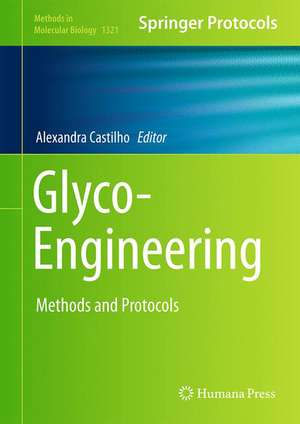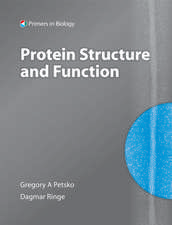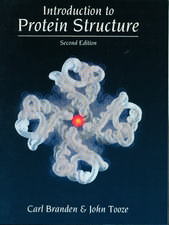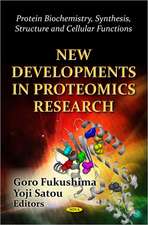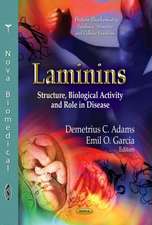Glyco-Engineering: Methods and Protocols: Methods in Molecular Biology, cartea 1321
Editat de Alexandra Castilhoen Limba Engleză Hardback – 17 iun 2015
Authoritative and extensive, Glyco-Engineering: Methods and Protocols offers vast options to help researchers to choose the expression system and approach that best suits their intended protein research or applications.
| Toate formatele și edițiile | Preț | Express |
|---|---|---|
| Paperback (1) | 596.90 lei 38-45 zile | |
| Springer – 9 oct 2016 | 596.90 lei 38-45 zile | |
| Hardback (1) | 661.48 lei 6-8 săpt. | |
| Springer – 17 iun 2015 | 661.48 lei 6-8 săpt. |
Din seria Methods in Molecular Biology
- 9%
 Preț: 791.59 lei
Preț: 791.59 lei - 23%
 Preț: 598.56 lei
Preț: 598.56 lei - 20%
 Preț: 882.95 lei
Preț: 882.95 lei -
 Preț: 252.04 lei
Preț: 252.04 lei - 5%
 Preț: 802.69 lei
Preț: 802.69 lei - 5%
 Preț: 729.61 lei
Preț: 729.61 lei - 5%
 Preț: 731.43 lei
Preț: 731.43 lei - 5%
 Preț: 741.30 lei
Preț: 741.30 lei - 5%
 Preț: 747.16 lei
Preț: 747.16 lei - 15%
 Preț: 663.45 lei
Preț: 663.45 lei - 18%
 Preț: 1025.34 lei
Preț: 1025.34 lei - 5%
 Preț: 734.57 lei
Preț: 734.57 lei - 18%
 Preț: 914.20 lei
Preț: 914.20 lei - 15%
 Preț: 664.61 lei
Preț: 664.61 lei - 15%
 Preț: 654.12 lei
Preț: 654.12 lei - 18%
 Preț: 1414.74 lei
Preț: 1414.74 lei - 5%
 Preț: 742.60 lei
Preț: 742.60 lei - 20%
 Preț: 821.63 lei
Preț: 821.63 lei - 18%
 Preț: 972.30 lei
Preț: 972.30 lei - 15%
 Preț: 660.49 lei
Preț: 660.49 lei - 5%
 Preț: 738.41 lei
Preț: 738.41 lei - 18%
 Preț: 984.92 lei
Preț: 984.92 lei - 5%
 Preț: 733.29 lei
Preț: 733.29 lei -
 Preț: 392.58 lei
Preț: 392.58 lei - 5%
 Preț: 746.26 lei
Preț: 746.26 lei - 18%
 Preț: 962.66 lei
Preț: 962.66 lei - 23%
 Preț: 860.21 lei
Preț: 860.21 lei - 15%
 Preț: 652.64 lei
Preț: 652.64 lei - 5%
 Preț: 1055.50 lei
Preț: 1055.50 lei - 23%
 Preț: 883.85 lei
Preț: 883.85 lei - 19%
 Preț: 491.88 lei
Preț: 491.88 lei - 5%
 Preț: 1038.84 lei
Preț: 1038.84 lei - 5%
 Preț: 524.15 lei
Preț: 524.15 lei - 18%
 Preț: 2122.34 lei
Preț: 2122.34 lei - 5%
 Preț: 1299.23 lei
Preț: 1299.23 lei - 5%
 Preț: 1339.10 lei
Preț: 1339.10 lei - 18%
 Preț: 1390.26 lei
Preț: 1390.26 lei - 18%
 Preț: 1395.63 lei
Preț: 1395.63 lei - 18%
 Preț: 1129.65 lei
Preț: 1129.65 lei - 18%
 Preț: 1408.26 lei
Preț: 1408.26 lei - 18%
 Preț: 1124.92 lei
Preț: 1124.92 lei - 18%
 Preț: 966.27 lei
Preț: 966.27 lei - 5%
 Preț: 1299.99 lei
Preț: 1299.99 lei - 5%
 Preț: 1108.51 lei
Preț: 1108.51 lei - 5%
 Preț: 983.72 lei
Preț: 983.72 lei - 5%
 Preț: 728.16 lei
Preț: 728.16 lei - 18%
 Preț: 1118.62 lei
Preț: 1118.62 lei - 18%
 Preț: 955.25 lei
Preț: 955.25 lei - 5%
 Preț: 1035.60 lei
Preț: 1035.60 lei - 18%
 Preț: 1400.35 lei
Preț: 1400.35 lei
Preț: 661.48 lei
Preț vechi: 778.21 lei
-15% Nou
Puncte Express: 992
Preț estimativ în valută:
126.57€ • 132.15$ • 104.76£
126.57€ • 132.15$ • 104.76£
Carte tipărită la comandă
Livrare economică 04-18 aprilie
Preluare comenzi: 021 569.72.76
Specificații
ISBN-13: 9781493927593
ISBN-10: 1493927590
Pagini: 439
Ilustrații: XVI, 439 p. 79 illus., 52 illus. in color.
Dimensiuni: 178 x 254 x 28 mm
Greutate: 1 kg
Ediția:2015
Editura: Springer
Colecția Humana
Seria Methods in Molecular Biology
Locul publicării:New York, NY, United States
ISBN-10: 1493927590
Pagini: 439
Ilustrații: XVI, 439 p. 79 illus., 52 illus. in color.
Dimensiuni: 178 x 254 x 28 mm
Greutate: 1 kg
Ediția:2015
Editura: Springer
Colecția Humana
Seria Methods in Molecular Biology
Locul publicării:New York, NY, United States
Public țintă
Professional/practitionerCuprins
Current Approaches to Engineering N-Linked Protein Glycosylation in Bacteria.- Inverse Metabolic Engineering for Enhanced Glycoprotein Production in Escherichia coli.- GlycoSNAP: A High-Throughput Screening Methodology for Engineering Designer Glycosylation Enzymes.- Production of Glycoproteins with Asparagine-Linked N-Acetylglucosamine in Escherichia coli.- Glyco-Engineering O-Antigene-Based Vaccines and Diagnostics in E. coli.- Progress in Yeast Glycosylation Engineering.- Protein Production with a Pichia pastoris OCH1 Knock-Out Strain in Fed-Batch Mode.- Engineering the Pichia pastoris N-Glycosylation Pathway Using the GlycoSwitch Technology.- Development of a Valuable Yeast Strain Using a Novel Mutagenesis Technique for the Effective Production of Therapeutic Glycoproteins.- An Overview and History of Glyco-Engineering in Insect Expression Systems.- SweetBac: Applying MultiBac Technology Towards Flexible Modification of Insect Cell Glycosylation.- Engineering Sialic Acid Synthesis Ability in Insect Cells.- Engineering N-Glycosylation Pathway in Insect Cells: Suppression of β-N-Acetylglucosaminidase and Expression of β-1,4-Galactosyltransferase.- N-Glyco-Engineering in Plants: Update on Strategies and Major Achievements.- Gene Targeting for Precision Glyco-Engineering: Production of Biopharmaceuticals Devoid of Plant-Typical Glycosylation in Moss Bioreactors.- Im“plant”ing of Mammalian Glycosyltransferase Gene into Plant Suspension-Cultured Cells Using Agrobacterium-Mediated Transformation.- Transient Glyco-Engineering of N. benthamiana Aiming at the Synthesis of Multi-Antennary Sialylated Proteins.- Subcellular Targeting of Proteins Involved in Modification of plant N- and O-Glycosylation.- Assembly of Multigene Constructs Using Golden Gate Cloning.- Strategies for Engineering Protein N-Glycosylation Pathway in Mammalian Cells.- Glycan Remodelling with Processing Inhibitors and Lectin-Resistant
Eukaryotic Cells.- Production of Highly Sialylated Recombinant Glycoproteins Using Ricinus communis Agglutinin-I-Resistant CHO Glycosylation Mutants.- Metabolic Glyco-Engineering in Eukaryotic Cells and Selected Applications.- Evaluation of Quenching and Extraction Methods for Nucleotide/Nucleotide Sugar Analysis.- Chemoenzymatic Glyco-Engineering of Monoclonal Antibodies.- Chemical Polysialylation of Recombinant Human Proteins.- Site Specific Glycosylation Profiling Using Liquid Chromatography-Tandem Mass Spectrometry (LC-MS).- Mass Spectrometric Analysis of Oligo- and Polysialic Acids.- Isomer-Specific Analysis of Released N-Glycans by LC-ESI MS/MS with Porous Graphitized Carbon.
Eukaryotic Cells.- Production of Highly Sialylated Recombinant Glycoproteins Using Ricinus communis Agglutinin-I-Resistant CHO Glycosylation Mutants.- Metabolic Glyco-Engineering in Eukaryotic Cells and Selected Applications.- Evaluation of Quenching and Extraction Methods for Nucleotide/Nucleotide Sugar Analysis.- Chemoenzymatic Glyco-Engineering of Monoclonal Antibodies.- Chemical Polysialylation of Recombinant Human Proteins.- Site Specific Glycosylation Profiling Using Liquid Chromatography-Tandem Mass Spectrometry (LC-MS).- Mass Spectrometric Analysis of Oligo- and Polysialic Acids.- Isomer-Specific Analysis of Released N-Glycans by LC-ESI MS/MS with Porous Graphitized Carbon.
Textul de pe ultima copertă
Conceived with the intention of providing an array of strategies and technologies currently in use for glyco-engineering distinct living organisms, this book contains a wide range of methods being developed to control the composition of carbohydrates and the properties of proteins through manipulations on the production host rather than in the protein itself. The first five sections deal with host-specific glyco-engineering and contain chapters that provide protocols for modifications of the glycosylation pathway in bacteria, yeast, insect, plants, and mammalian cells, while the last two sections explore alternative approaches to host glyco-engineering and selected protocols for the analysis of the N-glycans and glyco-profiling by mass spectrometry. Written for the highly successful Methods in Molecular Biology series, chapters include introductions to their respective topics, lists of the necessary materials and reagents, step-by-step, readily reproducible laboratory protocols, and tips on troubleshooting and avoiding known pitfalls.
Authoritative and extensive, Glyco-Engineering: Methods and Protocols offers vast options to help researchers to choose the expression system and approach that best suits their intended protein research or applications.
Authoritative and extensive, Glyco-Engineering: Methods and Protocols offers vast options to help researchers to choose the expression system and approach that best suits their intended protein research or applications.
Caracteristici
Features protocols in glyco-engineering in bacteria, yeast, insects, plants and mammalian cells Provides step-by-step detail essential for reproducible results Contains key notes and implementation advice from the experts
